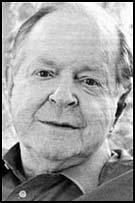Robert Conquest

Robert Conquest, the son of a wealthy American, was born in Malvern on 15th July, 1917. After Winchester he studied politics, philosophy and economics at Magdalen College, Oxford. While at university he became a member of the Communist Party.
In 1939 he joined the British Army after the outbreak of the Second World War. For the next six years he served in the Oxford and Buckingham Light Infantry.
After the war Conquest joined the British Foreign Office and while serving in Bulgaria he saw the communists overthrow the government. In 1948 he moved to the Foreign Office's Information Research Department. Conquest's work included combating Soviet propaganda and acquiring evidence for its secret anti-communist campaign.
In 1963 Conquest became literary editor of the Spectator. He also wrote several books about Joseph Stalin and the Soviet Union. This has included Power and Politics in the USSR (1960), Common Sense About Russia (1962), Russia After Khrushchev (1968), The Great Terror (1969), The Nation Killers (1969) and Lenin (1970).
Conquest supported the Labour Party until Margaret Thatcher became leader of the Conservative Party. In recent years has written speeches for several right-wing politicians including Margaret Thatcher and developed what has become known as Conquest Law: ""Everyone is a reactionary about subjects he understands."
In 1981 Conquest was offered a post at the Hoover Institution in California. Books published in recent years includes Inside Stalin's Secret Police (1985), Stalin and the Kirov Murder (1989), Stalin, Breaker of Nations (1991), Reflections on a Ravaged Century (1999), Harvest Of Sorrow: Soviet Collectivation and the Terror-Famine (2002) and The Dragons of Expectation: Reality and Delusion in the Course of History (2006).
Primary Sources
(1) Neal Ascherson, writing about the impact of The Great Terror published in 1969.
He was very influential in that he immensely encouraged one side and was dismissed by the other, because people were in such entrenched positions. This meant that people accepted his facts; but they didn't accept his conclusions. People were detained in condemning him by the fact that he was a very good poet. That was well known. Everyone by then could agree that Stalin was a very wicked man and a very evil one, but we still wanted to believe in Lenin; and Conquest said that Lenin was just as bad and that Stalin was simply carrying out Lenin's programme.
(2) Andrew Brown, The Guardian (15th February, 2003)
He is also the boldest theorist of the pro-American lobby in British politics. He would like Britain to withdraw from the EU and form part of a much looser association of English-speaking nations, known as the "Anglosphere". This is very close to Mrs Thatcher's visceral loathing of Europe, but informed by a much greater experience of European life and languages.
"Margaret Thatcher is the only person in politics, along with Condi Rice, with whom I am on cheek-kissing terms," Conquest says. Asked through an intermediary to help her with a speech on Russia in 1976, he wrote a draft, "and I met her: that was the first Iron Lady speech".
They get on very well together, according to Garton Ash. He also likes Ronald Reagan, describing him and Alec Douglas-Hume as "the only two politicians who wanted to get something out of you in conversation rather than tell you their views".
